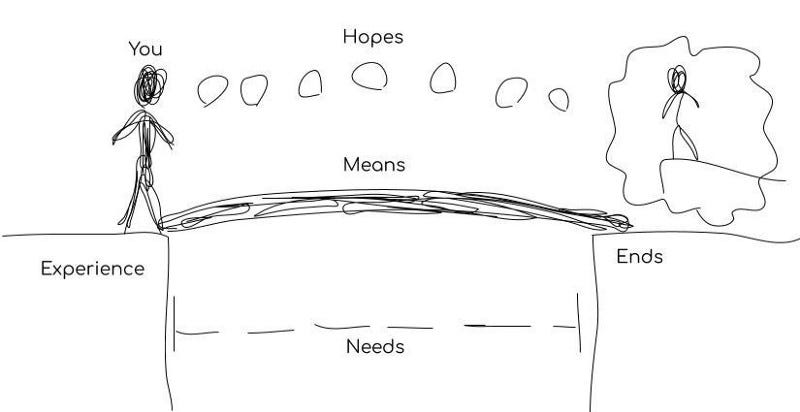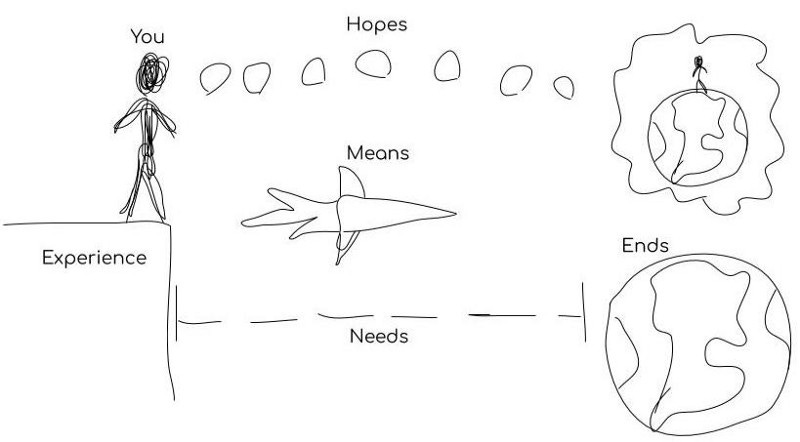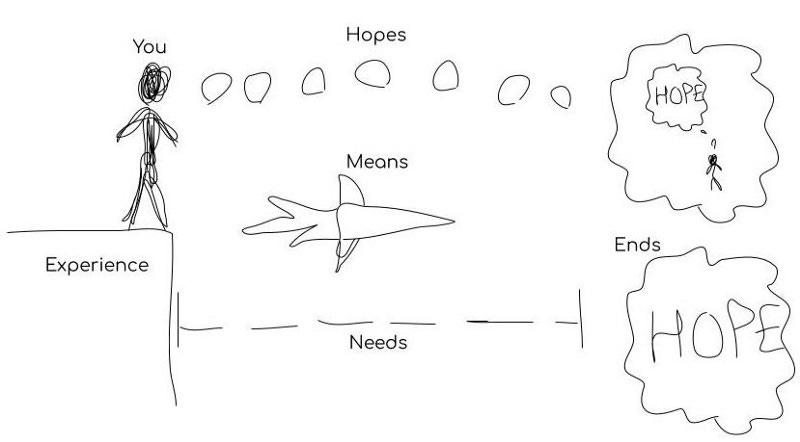Why and How to Keep Hoping
Hope has never felt harder than it does this year. But hope is worth it, no matter how hard it is. Because hope is the only way forward.
Hope has never felt harder than it does this year.
For me, that is saying something, considering I lived with untreated depression for the first 25 years of my life. Now that I have more help, I expected hope to be easier.
But the challenge has evolved. With depression, the despair was internal. It was subjective. If I looked for evidence to support it, I usually came up short.
Now it feels like the truth. It seems like the world in general and the U.S. in particular has gone to hell. Our president is a cartoon villain, and enough of the country supports him that the election isn’t a sure thing. The people who are supposed to protect us kill and hurt people freely and without repercussion.
You know all this. I won’t list more.
There is evidence that the world is better than it’s ever been. I’m not going to go into that. I’m not going to try to convince you things are somehow okay. Even if some things are better than they look, your fear is still valid and your desire for change is still worthwhile.
So how the heck are we supposed to hope? Why even bother?
We hope because it’s hard. We hope because it’s worth it.
Because hope is the only choice.
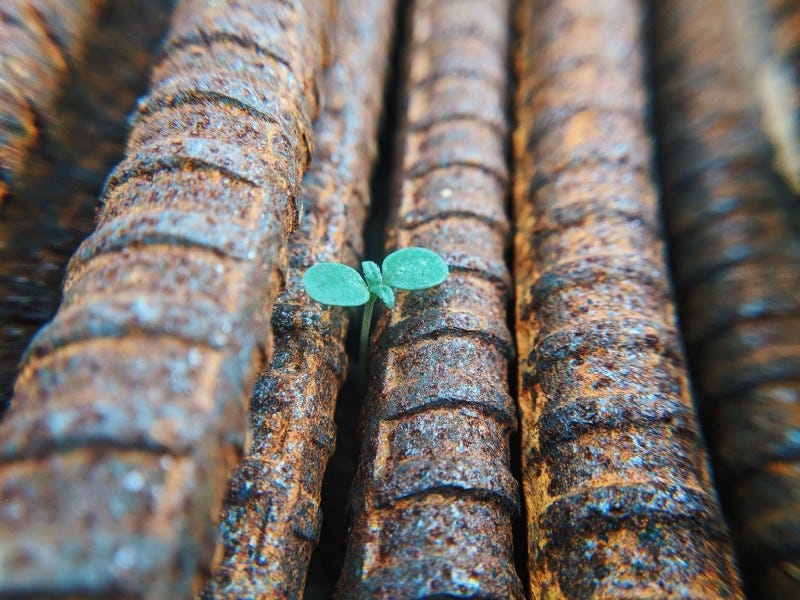
What is Hope?
Let’s level-set. Merriam-Webster defines hope as a desire accompanied by expectation of or belief in fulfillment. I’m going to simplify this (as I always do): Hope is the expectation of something you want.
Understanding hope this way makes it an essential component of the basic human experience. Your life experience is simply a series of stories that introduce wants and needs that you try to satisfy with the choices you make.
Your experience is where you are.
Your ends are where you want to be.
Your want or need is the gap.
Your actions, or “means”, are the bridge.
Hope is why you build the bridge.
So why would you do anything if you didn’t have hope? If you didn’t expect you’ll get something you want?
Literally everything we do is driven by need and the hope that the need can be satisfied.
Whether you feel it or not, you are powered almost entirely by hope.
Hope is fuel. Our brains love it. When you want a brain to chase something, tell it a story with hope in it. Show it what good can be.
We know brains love scary stories too. Often there’s a push and pull with every decision we make. But you can’t just swim from the sharks — you have to swim toward the boat.

That’s what hope is for.
When Hope is Helpless
I realize that most of the times we talk about hope we’re not talking about the simple expectation that our actions will have the desired consequences. Usually, we use hope for things we can’t control.
In that context, hope is a kind of hand-off to the universe. I hope you feel better. I hope the local team wins. I hope that movie will be good.
This helpless kind of hope gives all hope a bad reputation. Here’s why:
It’s passive — All you can do is wait. Everything is out of your hands, and your feelings here mean nothing real. (I haven’t seen any evidence for efficacy of thoughts or prayers, though there may be personal benefits.)
It’s unreliable — I don’t mean to be a downer, but you will be disappointed. Don’t expect things to go well without making efforts to ensure it. Watching and waiting without a plan is pretty much just doomscrolling.
It’s distracting — Any energy spent hoping the universe will shift itself in your direction would be better spent building a bridge to a better world. Spending time hoping helplessly is no better than spending time worrying uselessly.
Obviously I’m not recommending that you stop having preferences for what the future might hold. I just ask that you acknowledge that’s all they are.
Helpless hope is no more than waiting. And there’s nothing wrong with waiting! But stay curious, not expectant.
When we say “I hope you feel better,” the kind words mean more than the hope itself. Our expectations are irrelevant, so “hope” isn’t quite the right word. It just sounds better than “I’d like you to feel better, but have no idea what will actually happen.”
What you want only matters if it moves humanity forward.
And it can.
Why Hope Is Worth It
Is there even room for hope in this universe? There’s a number of reasons philosophically minded folks doubt there’s hope in the universe
We’re insignificant in an infinite universe
This could be a simulation
We’ll all die one day
We’re alone
There’s one recurring theme that makes all of the above irrelevant.
Our scale.
The universe is too big, or fake, or one of many, or whatever. So what? I don’t need to care about the whole universe right now. I need to care about you, me, my family, my community, and my species.
Does my life matter to the planet? To all of history? I don’t know. But it also doesn’t matter to an ant or an elephant and I’m not losing sleep over that.
It’s all about scale. What is real and what matters is a local issue. I have a life purpose to my daughter, to my wife, and to myself.
Do I have a cosmic purpose? I don’t know why would matter to me. If I have a purpose, I’ll serve it. If I don’t, no worries.
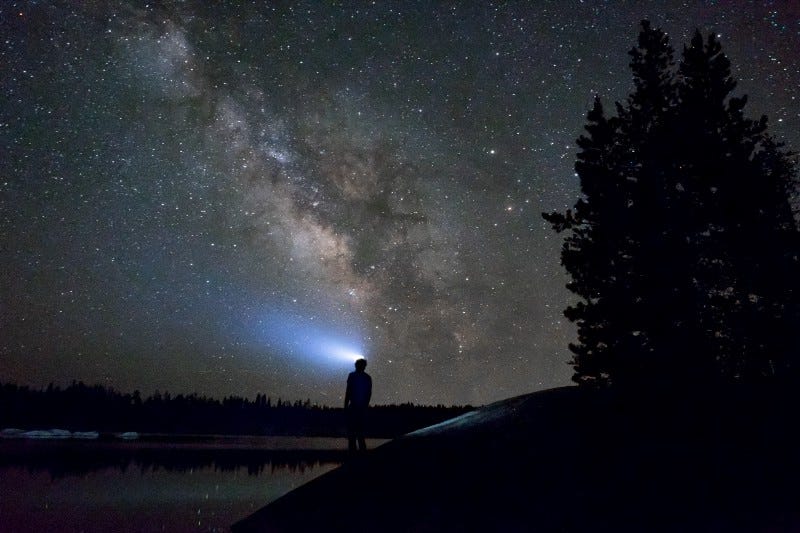
My hopes for humanity’s future are vast, and they are beautiful, and I want them to come true. But my hopes for today, for my life, and for my family are the ones that will matter most.
So why hope if…
We’re insignificant in an infinite universe? We hope because we’re significant to each other.
This could be a simulation? We hope because we’re in it together.
We’ll all die one day? We hope because it’s not over yet.
We’re alone? We hope because we have meaning to ourselves.
Where Hope Exists Today
So, fine, there’s hope in the universe. But what about for the country threatened by fascist rule? What about the planet gripped by a pandemic? What about the exploitative economic system that’s already collapsing around us?
Protesting feels so small. It can feel like we’re shouting into the wind. I do think you’re making a difference, but here’s the twist: I don’t think you need to make a difference for your actions to matter.
Your actions matter in themselves. They are worth doing, even if they fail.
As I mentioned above, hope is why we do things. We make choices because we hope, meaning we expect good results. Choosing hope is choosing energy. Choosing energy increases good options.
We don’t know how it’ll end. We don’t know what difference it makes. All we know is that we made the right choice when we made it. That can be enough.
Because the choice itself serves a purpose.
It serves a purpose to you. For something to serve a purpose, it just has to close the gap between a need and reality.

When you protest (for instance), you might be working on a larger need for justice. You’re definitely showing others they’re not alone. But you’re also serving a purpose to yourself. You’re showing yourself that you’re who you want to be. You’re expressing your passion.
Whether you make a difference matters to everyone. Whether you feel like you’re making a difference might matter only to you. But it still matters.
What matters to you matters. Don’t let anyone say different.
So you’re fulfilling your hopes simply by acting. Keep moving forward.
But what if you fail?
When Hope Fails
I fail a lot. I’m good at it.
And I’m learning to love it.
Disappointment is how you learn. It’s not the end of the world. With enough curiosity, it can be as good as anything else.
Hope it’ll go right, and it might not. Hope you’ll learn, and you’ll never be disappointed.
Scientists form their hypothesis and then aim to disprove it. It’s a nice solve: if you’re trying to disprove your hypothesis, you win either way. Either your hypothesis was right or you successfully disproved it. Great job!
Wanting gets you nothing. Wondering gets you knowledge.
And that’s not nothing.
Failing can be discouraging, especially when it keeps coming. When it feels like you’re not even making a dent, but starting over from scratch time after time.
Even if you remember that you’re learning as it happens, maybe the thing you’re learning is discouraging in itself. If you hit a wall 100 times, you’ve learned that hitting walls hurts. That’s hard to get excited about.
Depending on the kind of wall you’re hitting, there are two ways to go about this kind of problem.
Change your approach — Imagine you need to get through a wall. You hit it with your fist, and all that happens is you hurt your fist. It doesn’t otherwise budge. I can’t recommend trying the exact same thing again. You could give up hope. Or you could go get a sledgehammer.
Change your target — Imagine the wall breaks your sledgehammer. You’re exhausting yourself. This wall isn’t budging. My recommendation? Stop. Don’t mourn the wasted effort — you got some exercise. But it’s time to find another wall — maybe one with a door in it?
An example: I spent two years writing a novel. I sent query letters to agents. Every group of rejections I got, I edited the query letter for a new approach. After enough rejections, I picked a new target and started querying small publishers instead. I sold to a publisher. They went bankrupt before the book came out. I’ve taken a break from writing fiction. But I’m still writing. I still have hope.
How to Hope for Humanity
We power ourselves with hope because anything we do…
is relevant to our reality
has meaning to us
teaches us
But the despair that’s gripping so many of us isn’t a local despair, is it? It’s not just about whether we, personally, are doing the right things or can achieve our immediate goals.
We despair for the country. For our species. For our planet.
And the facts support our fear, don’t they?
We need more than justification for our next actions. We need to know how to hope for humanity. The gap I described above can’t be easily bridged.
We need a whole new world. We need enough hope to get us there.
Where will we find that?
During a particularly bleak time on a work project, a co-worker asked how I remained so positive.
“Because I still have a plan,” I said.
So here’s the plan for hope in humanity.
Step One: Hope for Hope
With depression, positivity and hope never come easily to me. I’m wired for despair. I never had much of a choice. I can’t just choose happiness or hope. I have to chase it.
When hope is both an almost unattainable goal and a necessary weapon against a brain that wants you dead, you have to learn it. You have to fight for it.
I seem positive because I’m chasing positivity.
I look hopeful because I hope for hope.
The nice thing about seeking hope itself is that it’s all inside your head. It’s not easy, but you know it’s not impossible.
And you don’t actually need to succeed to be able to start on the next step. You can use your hope for hope to fuel your work on the next step. Sure, it’s a little like paying down debts with a credit card. But it works in a pinch.
Example: I’m terrified about climate change. I worry that my daughter will witness total climate collapse. Before I can even do anything about that, I need to want to believe something better. I need to hope for hope. I find fiction helps me with that. Even post-apocalyptic stories have beauty in them.
Step Two: Tell a Better Story
Our understanding of reality is made up of stories. That experience you’re starting from isn’t the whole truth — it’s just the story you’re working with.
But is it working for you?
A good story increases good options, clarifies choices, and brings energy (aka hope) for everyone it touches. If your story has an undefeatable villain, it’s probably not good enough to work with.
I wrote in depth about how to break down a bad story and create a better one, and those strategies all largely stand here. Here’s a quick synopsis:
Catch the bad story — Examine your current view of reality and the future and determine if it’s giving you good options and energizing you.
Break the bad story — Short-circuit the bad story by taking it to its most horrific extremes until it’s impossible to mistake for reality.
Create new stories — Brainstorm a handful of new stories that seem plausible and have supporting evidence in reality.
Pick a better story — Pick the one that feels most useful and realistic. It’s not a fantasy — it’s important that you can understand it as reality.
Live your new story — Take at least one action that fits that story. In this case, I have a specific recommendation for what that action might be.
Example: Believing in the inevitability of total climate collapse is not that helpful for me. So I come up with a new story — humans have conquered a lot of things, and can fix the damage we’ve done to the planet too. Even if I did believe climate collapse was unavoidable, I’d still be able to pursue a plan (featuring bunkers and survival training, or maybe space travel).

Step Three: Craft a Plan
You’ve got a better story for the reality you’re living in, but it’s still not the reality you want. It’s still scary, but it’s not so bad that it’s completely draining your energy. Use that energy to make a plan to make it better.
Your plan should be energizing, possible, and involve elements that are within your control. It can be as simple as volunteering to help with a larger plan. Like all plans, it might fail. Be open to that — you’ll learn, adjust, and try a new way.
Start with the end in mind. We’re talking about worldwide problems, so you can go big here. What would a utopia look like? How do we eradicate global warming? Don’t worry about the details, you’ll find answers and allies as you move forward.
Now that you have your goal, think about the milestones on the way. Your first milestone might still feel big, but should be imaginable. Maybe find a group with a bigger plan you can support.
Now take that milestone apart. What’s your first step to get there?
Take that step. Immediately.
Then make a plan to complete the next step. If you can find one, join a group that shares your goals. If you can’t, start one.
Example: Reversing climate change is a big challenge that requires drastic reforms and global cooperation. But that’s the end-game. Some milestones to get there include the Green New Deal, which would require a new president and senate. So first milestone is a blue wave in November. First step? A donation to swingleft.org!
Step Four: Act, Measure, and Adapt
This plan is your beacon, and it’s where your hope goes. When you take action, you serve your plan. When you rest, you serve your plan. When you take a break from your plan, it’s so you can serve it better some other time.
(And rest is important! Essential. The whole point of your plan and your hope is to give you the energy you need. Rest contributes.)
What matters is your vision. Every step forward is beautiful and meaningful in itself. The result is educational at worst.
If your plan fails, you learn from it and you make a new plan, and then you work on that. No matter what, you’re trying. You’re doing what you must. You’re doing all you can.
And knowing that matters more than success does. For this plan to give you hope, all it needs to do is exist. Whenever you feel hopeless, just think about your plan.
And if you feel hopeless about something else?

Step Five: Stay in Your Lane
You’re not alone. Other people — powerful, driven, good people — care about the same things you care about. And they have plans too.
You can’t save the world alone. Luckily, you don’t have to. Your responsibility is to your plan and to your word. The rest can be delegated to others.
Delegation is famously difficult. Other people do things in strange ways, and they make mistakes you wouldn’t make. But remember — to them, you are “other people.” Your odds aren’t much better than theirs.
I don’t even care about your expertise, or skillset, or passion. What I care about most is your energy. You can’t solve it all. That’s just a fact.
So you need others.
You don’t need to know them, or trust them, or supervise them. Just know they’re there, and they’ve got your third priority as their first priority.
You’ve probably heard the serenity prayer, right? “God grant us the serenity to accept the things we cannot change, the courage to change the things we can, and the wisdom to know the difference.”
Whether you acknowledge a higher power or not, please understand that you’re not the only power. There are other people in the world, and their internal lives and hopes and dreams are just as rich and powerful as yours.
So, seek the serenity to accept that others have plans, the courage to work your plan, and the wisdom to know where to draw the line.
And then just stay curious.


